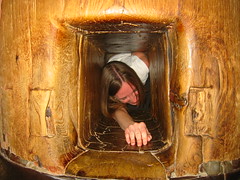Gordon Brown made a grand gesture a week ago, apologizing for having banished British orphaned children after WWII to a country on the other side of the world, where many were maltreated for years, spoiling their childhoods at least, leading to life-long hardships often. Yet, still ingrained in British culture is a lack of appreciation for childhood, as evidenced by the prevalence of the very manageable “children’s disease”: lice. Currently, head bugs are treated as a socioeconomic issue, such that teachers are banned from even mentioning the presence of these pests, as if such talk infringes on a person’s rights, as if it is a problem of the poor. On the contrary, the bugs do not discriminate and do not ask salaries before feasting on one’s blood, although they do prefer a clean head.
In contrast to the situation with lice, rules exist for other medical conditions, and a child displaying signs of flu, for example (e.g. vomiting), is sent home. Why? Because diseases such as the flu are contagious, much like head lice, and precautions should be taken to minimize the spread. Unlike the flu, however, head lice can be easily cured. So, given all of these medical facts, why is this vector of disease for blood-born pathogens allowed to continually infect the children of England and the adults who work in the setting? My only guess why an easily curable disease is not managed properly is because it has been classified as a “disease of children”, who sadly, are still not made enough of a priority in British society.
The British government needs to step up and establish rules regarding the medical condition, in order to stop the continual infestation of their own children. Children infected with lice may have a hard time focusing on school, similar to working in the presence of a very sore ankle or an itchy spot of dry skin. Imagine trying to learn whilst your head is constantly itching. Put simply, managing this problem is part and parcel of providing a good school environment. Rules and measures must be implemented for the good of our own children, but also for our friends’ kids, and importantly, for the teachers, as well. Members of Parliament, please imagine working in a setting where there is a constant threat of catching itch-inducing bugs. And, best of all, this issue is NOT akin to solving world hunger; it is easily cured.
Stroll
7 years ago




3 comments:
Hey! Sorry I havent been past for a while! Head lice here is pretty normalised - notes go home to the whole class if there's an infestation, and the recommended treatment is quite cheap and easy - conditioner and a nit comb. IN other ways though children and childhood are devalued in a similar way...It's that English speaking first-world thing, a sign of affluence is not having your children close to you, like they're some kind of burden. So we spend crazy money on prams and cots, and put our children to sleep in separate rooms from birth, pay someone else to look after them...
Hey Mummy!
This is a bit of a tumbleweed zone really...quick fair not to have been around. :-) I DO miss it though sometimes...and connecting with you guys regularly. A little bliss, from blogging :-)
Interesting to hear the Australian take on these pests...it sounds like you guys handle it like we do in America. :-) I *really* hoping our move back to England will not restart the lice issue (we've never contacted it once on this side of the pond). Fortunately, since Noel is a little older and in a different school, I think we have a decent chance of avoiding the problem...or at least not making it a bimonthly sickness.
And I've heard that Brazil is much the same way....pawning children off to caretakers, much like well-to-do areas of the States.
*sigh*
Apna Showroom Brass Gangajal Kalash Lota is the perfect blend of tradition and elegance for rituals. Elevate personal fashion with premium metal hairband, stylish fishnet stockings for women, and timeless black stockings for women. Manage daily hairstyles with lice comb, banana hair clips, and sturdy hair clutcher for women. Boost businesApna_Showroom Nail Clipper Cutter for Women/Men - Stainless Steel
Apna Showroom Banana Hair Clips Clutcher for Girls/Women - Combo Pack of 7 - Multicolour, Medium Size)
Apna Showroom Gangajal Water Brass Kalash Lota For Puja - Filled from 'Brahma Kund' Har Ki Pauri, Haridwar - Authentic Ganga Jal Lota - 270 ML - Gangajal water for puja
s luck using vyapar vridhi yantra. Complete style with Tic Tac Hair Clips for Women/Girls, chic hairpin for women, snap hair clips, barrettes with multi print design, and colourful stlish clips pack.
Post a Comment